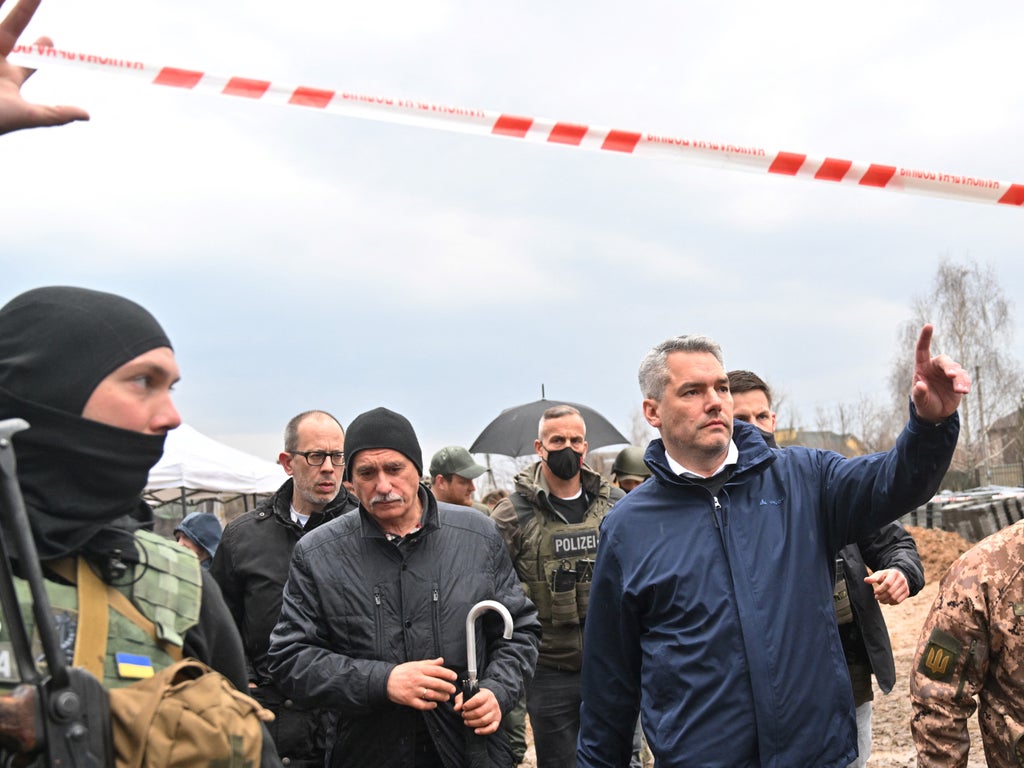
Austria’s chancellor Karl Nehammer − the only EU leader to meet Vladimir Putin since the invasion of Ukraine − has said the Russian president believes he is winning the war.
In an interview, Mr Nehammer said the conversation with the Russian president in Moscow last week was not friendly, describing it as “frank and tough”.
“I think he is now in his own war logic. He thinks the war is necessary for security guarantees for the Russian Federation,” he told NBC’s Meet The Press. “He doesn’t trust the international community. He blames Ukrainians for genocide in the Donbas region.”
In an earlier press briefing in Moscow, Mr Nehammer said he made it clear to Mr Putin that “his view is not shared by anybody”. The Austrian chancellor said the Russian president sees it as a “kind of self-defence operation of the Russian Federation. He calls it special military operations. I call it the war.”
Before his visit to Moscow, Mr Nehammer had visited Bucha in Ukraine and taken stock of the devastation left behind by the Russian forces. He said he wanted to be a “first-hand witness” before meeting Mr Putin. During his interview, he warned that “we have to look in his [Putin’s] eyes and we have to confront him with that, what we see in Ukraine”.
When NBC asked him what Mr Putin’s reaction was to his accusation of war crimes, Mr Nehammer said the Russian leader promised he “will cooperate with an international investigation, on one hand, and on the other hand, he told me that he doesn’t trust the western world. So this will be the problem now in the future”.
The chancellor also said he told Mr Putin that there must be humanitarian corridors in Mariupol, and added that there were no handshakes or photo ops during his meeting with Mr Putin.
Shortly after the Meet the Press broadcast, Russia’s defence ministry announced the opening of a window of surrender in Mariupol for Sunday morning, saying any Ukrainian forces that gave up their arms in this period would not be harmed. There was no indication on the ground that the offer had been taken up.
On Saturday, Ukrainian president Volodymyr Zelensky said that peace talks with Russia are at a “dead-end because we will not trade our territory and our people”. He said that if Russian forces follow through on their threat to destroy the last Ukrainian troops fighting in the port city of Mariupol, it would “put an end” to talks.
Mr Zelensky also spoke with British and Swedish political leaders on Saturday to discuss strategies on how best to help the Ukrainian forces and the remaining citizens in Mariupol.
In an address to the nation, the Ukrainian president said Mariupol’s fate could be decided either through battle or diplomacy. “Either our partners give Ukraine all of the necessary heavy weapons, the planes and − without exaggeration − immediately, so we can reduce the pressure of the occupiers on Mariupol and break the blockade ... or we do so through negotiations, in which the role of our partners should be decisive,” Mr Zelensky said.
Ultimately, the Austrian chancellor said he came away “pessimistic” from his meeting with the Russian leader. “We all can see that there is a preparation for a massive battle in the Donbas region. We will see many losses of human lives there,” he said.
Mr Nehammer added that Mr Putin believes that the sanctions are “really tough” but still thinks the war “is necessary”. When the Austrian chancellor was asked if he believes Mr Putin will use nuclear weapons, he said: “It is a tough question. He knows he has this weapon, and he knows the threat of this weapon. I don’t really know if he will use it but he knows that he can threaten the world with this weapon.”







